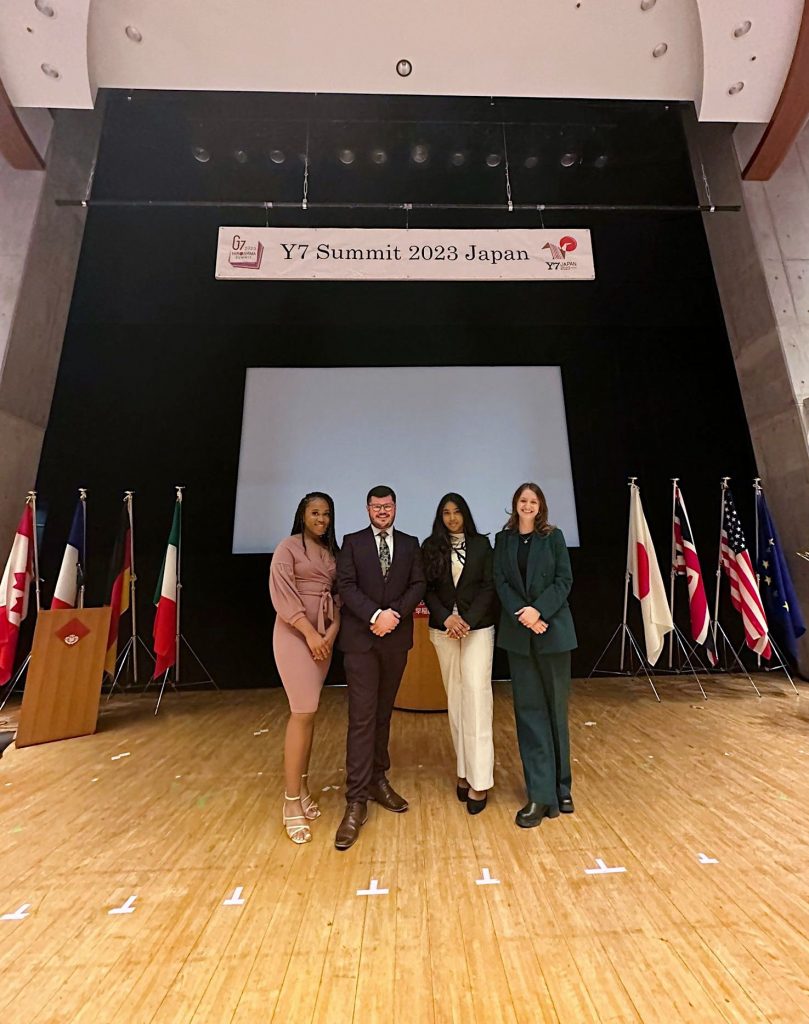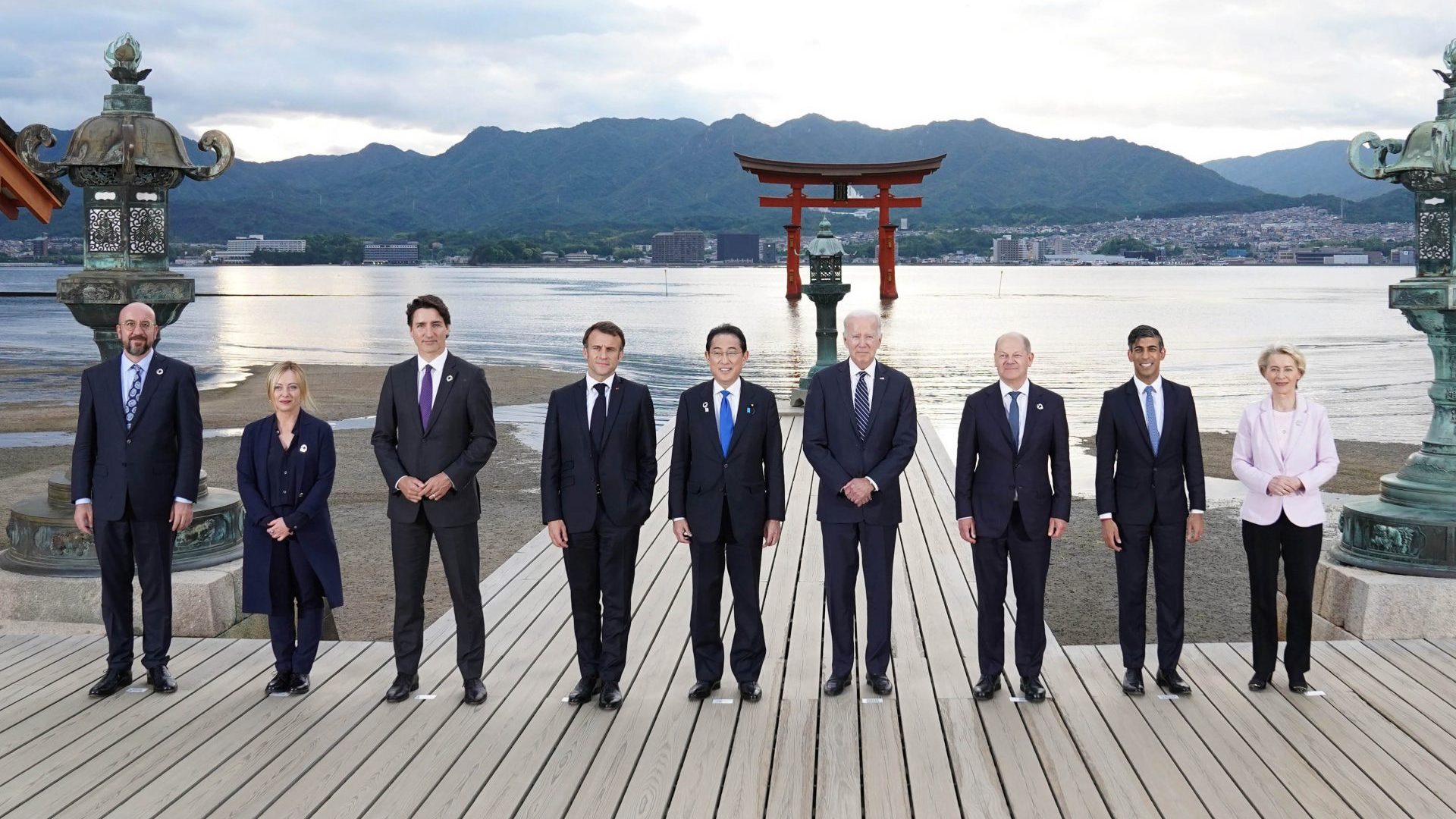The stakes are high for the 49th annual G7 summit taking place this weekend in Hiroshima. Not only does Vladimir Putin’s war in Ukraine continue to rage, but researchers have warned that our overheating world is set to break the key 1.5C limit for the first time in coming years, and exceptional rainfall is causing dangerous levels of flooding in Northern Italy.
Perhaps then, it’s understandable that Angela Minas, a social scientist specialising in low-carbon energy at the Tyndall Centre for Climate Change Research, doesn’t sound optimistic. An expert in her field, Minas knows the measures that now need to be taken by the leaders of the world’s most advanced democracies, but fears they won’t be. “The G7 is made up of people who can change the situation but don’t. There are other forces at play,” she says.
Minas is also an ambassador for One Young World, a global community of 13,700 of the world’s most impactful young leaders and activists working to install worldwide change for the younger generations. The Covid-19 pandemic and Putin’s invasion of Ukraine shattered the international order and, in between the cracks, countries are tackling global food shortages, increasingly stretched supply chains and an ever-worsening climate crisis. The think tank wants it made clear to politicians and lawmakers alike that, due to their innate longevity, these issues will likely impact youth the most.
“I know lawmaking is difficult,” concedes Minas, but she would still like to see more tangible legislation emerge from the national level where politicians can be held accountable for action on climate change. “However this legislation isn’t a big vote winner. That’s part of the issue,” she signs.
Minas’s frustration goes back over ten years, starting in Zurich and ending just last week in Westminster with Rishi Sunak. In 2011, Minas was invited to speak at the One Young World Summit in Zurich and in her address she called for an end to the reliance on fossil fuels. “I was living in the Philippines, one of the countries worst affected by climate change and it was important to me to reflect this,” she explains. Minas is right – eight years later, a 2019 report by the Institute for Economics and Peace cited the nation as the one most at risk from the climate crisis, with extreme weather and rising sea levels rapidly affecting the country’s future.
Last week, she was invited to Westminster to join MPs in support of the climate and ecology bill where she discussed, once again, the need to investigate energy sources other than fossil fuels. Later that same day, she sat in on PMQs to hear Sunak talk about just how important they were. “There is only so much you can do when leaders work against you,” Minas sighs before offering an apology. “Sorry if this sounds sad but that’s the reality. The more you learn about climate change, the more frustrated you get.” She explains to me that the answer lies in a low-carbon future and that a reliance on Russian oil and gas only worsened circumstances both environmentally and politically. For Minas, this fight is now personal, having recently become a mother. The future her child will see has become a factor.
Anna Stanley-Radière, also a One Young World ambassador, is more hopeful. The director for climate transparency at the World Business Council for Sustainable Development is seeing a “general sense of change” surrounding the issues, such as the war in Ukraine, the climate and energy crisis and economic resilience, that leaders are set to discuss.
Stanley-Radière feels encouraged by the communiqué published ahead of the summit last month by the G7 Climate, Energy and Environment Ministers which cites a strong commitment to the Paris Agreement and plans for reaching net zero by 2050. It’s also important to her that the role of the private sector is acknowledged as governments alone are not responsible. In this capacity, she is seeing companies starting to step up as the public and private spheres begin to work in unison.
In an ideal world, it’s this tone Stanley-Radière wants to see more of in media coverage. “Doomsday bell-ringing is important,” she says, “but individual stories need to be told.” The people whose daily lives are affected by global warming and are fighting it at a grassroots level need to be given a platform.
“We are also in the year of the global stocktake,” she explains. The global stocktake (GST) is part of the Paris Agreement, the first legally-binding agreement on climate change adopted at COP21 in 2015. It’s a yardstick to measure how much progress has been since then and to challenge countries to step up. The first stocktake began at the UN Climate Change Conference in Glasgow last November (COP26) and will conclude at COP28 later this year. “I am optimistic,” she says, looking ahead to the outcomes of the summit, “but that is part of my job.”
It’s a mindset that Renee Kapuku shares. Kapuku is the head delegate for the Y7, the official youth engagement group for the G7 summit. Representing individuals under the age of 30, together, they share with senior policymakers the priorities for young citizens across the G7.
“When we are in a room like the Y7 Summit, surrounded by bright people from around the world, it is hard to not feel optimistic,” she explains before offering a caveat. “But that being said, youth priorities are – in my experience – regularly trivialised as things that could be resolved in the future, viewed as ‘nice ideas’. Too often policies and issues that need action now, like climate action, preventative health and skills education, are not prioritised. But they will have the greatest effect on our future.”

“Leaders need to stop ‘listening’ for listening’s sake,” she says, sympathising with Minas’s frustration. As a collective, she feels their asks are not radical. They are asking for leaders to cooperate with them on ensuring public services, the economy, and countries are better in the years to come. She and her other delegates, Robert Murtagh, Molly Hartill and Loshini Subendran, see them to be evidence-based solutions working towards rebuilding the basic human rights of the G7 countries that should not be taken for granted. “As a generation,” she adds, “our lived experience should be considered valid.”
Back in the UK, she wants the government to do better in bringing young people to the table. In fact, policymakers need to alter the dialogue to ensure the youth feel they should be there in the first place.
When I ask if there is a greater sense of urgency this year, she has one answer: Absolutely. Russia’s invasion of Ukraine made the threat of conflict clear while economic stagnation and the cost-of-living crisis impacts the lives of millions of young people. “The quality of life for young global citizens is our priority right now, and this needs to be a priority for the G7 leaders.”
This is a reality Zoya Miari, also a One Young World ambassador, does not need reminding of. Miari has been a refugee twice, first as a Palestinian in Lebanon and now as a Ukrainian in Switzerland. Growing up, Ukraine was her place of safety, travelling there to visit her grandparents while escaping the violence in Lebanon. A year ago, when her mother told her the war was imminent, it become clear they would need to uproot their lives yet again. It was at this point she decided to use One Young World to spread her story, determined to get her voice in the room where change happens.
“During the summit, leaders should address how the war is affecting the younger generations. The best that could be done is to invite young leaders from both those who remained in Ukraine and those who fled the war,” Miari suggests. She believes these are the individuals best equipped to share the realities and struggles of the war as well as offer resolutions. “Merely witnessing leaders speaking on behalf of the young generation is insufficient. The real storytellers and representatives are those who have directly experienced the events,” she continues.
For her, the real success of the summit lies in taking steps towards ending the conflict. She admits that while the war has gained ample attention on the world stage, “no tangible progress has been made”. All the while, “lives continue to be lost, including innocent children and young people,” she says pointing towards the Mariupol hospital airstrike in March last year.
To this end, Miari wants leaders to consider the human cost of the war. “One last thing I would like to mention is that victims of the war need to be viewed as real people, not just as numbers or statistics displayed on slides during these summits. Leaders need to recognise that those who have lost their lives or are struggling because of this war are actual human beings. Treating them as such makes all the difference.”












